Evaluating Professional Scepticism in Auditing: An In-Depth Analysis
VerifiedAdded on 2022/08/14
|12
|3114
|16
Essay
AI Summary
This essay critically evaluates the concept of professional scepticism in auditing, as emphasized by the IAASB and FRC. It defines professional scepticism as a questioning attitude crucial for identifying potential misstatements and fraud in financial statements. The essay discusses the application of scepticism throughout the audit process, from client acceptance to evidence gathering, and highlights its importance in assessing risks, challenging management, and ensuring audit quality. It also explores the need for professional scepticism in the face of increasingly complex accounting standards like IFRS. Furthermore, the essay examines the incentives that may hinder auditors from applying scepticism, such as maintaining client relationships, generating additional revenue, and economic pressures. The analysis emphasizes the role of professional scepticism in maintaining auditor independence and objectivity, and in improving the overall quality and reliability of audits. The essay concludes by underscoring the importance of a firm's culture in reinforcing professional scepticism to mitigate biases and ensure vigilant auditing practices.
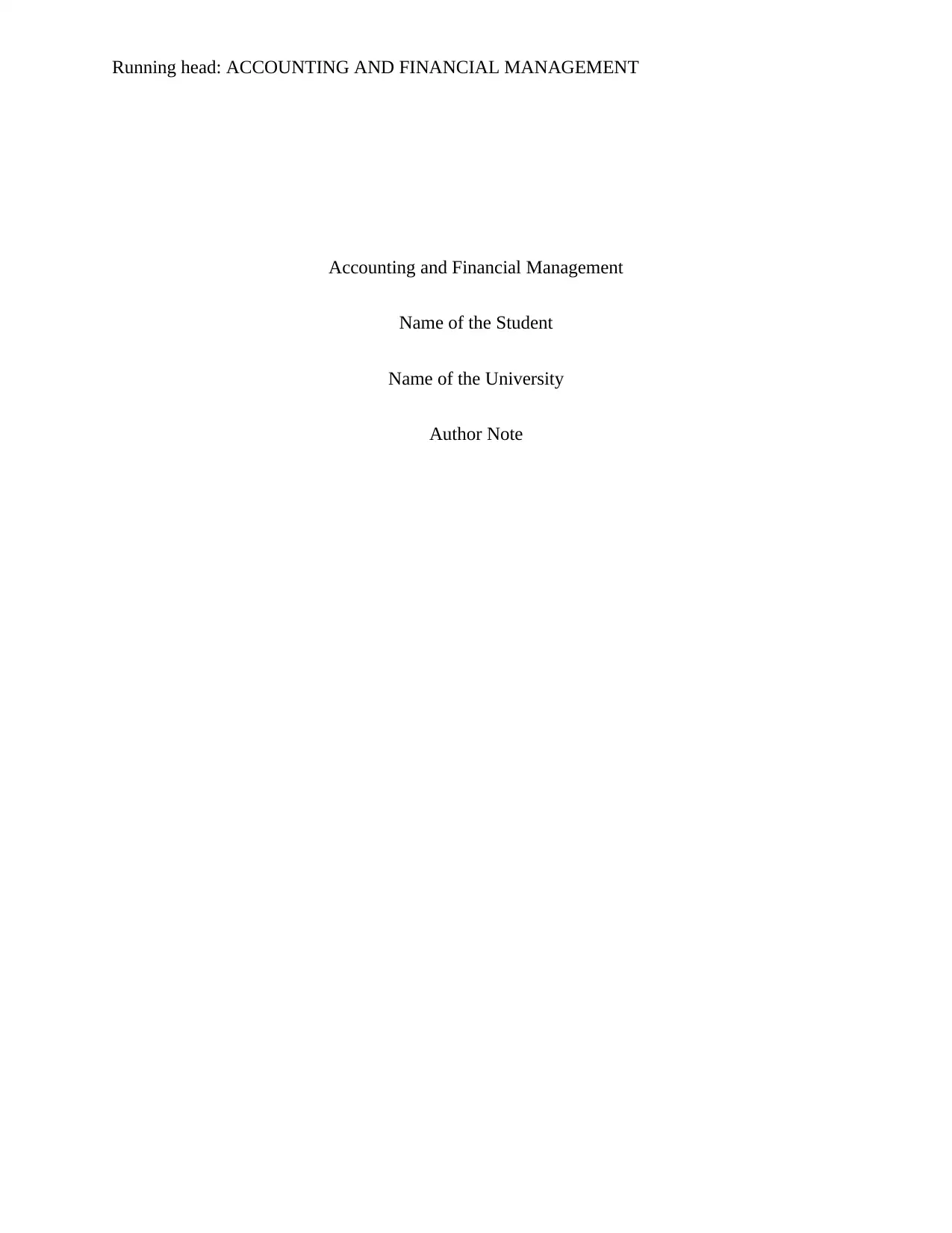
Running head: ACCOUNTING AND FINANCIAL MANAGEMENT
Accounting and Financial Management
Name of the Student
Name of the University
Author Note
Accounting and Financial Management
Name of the Student
Name of the University
Author Note
Paraphrase This Document
Need a fresh take? Get an instant paraphrase of this document with our AI Paraphraser
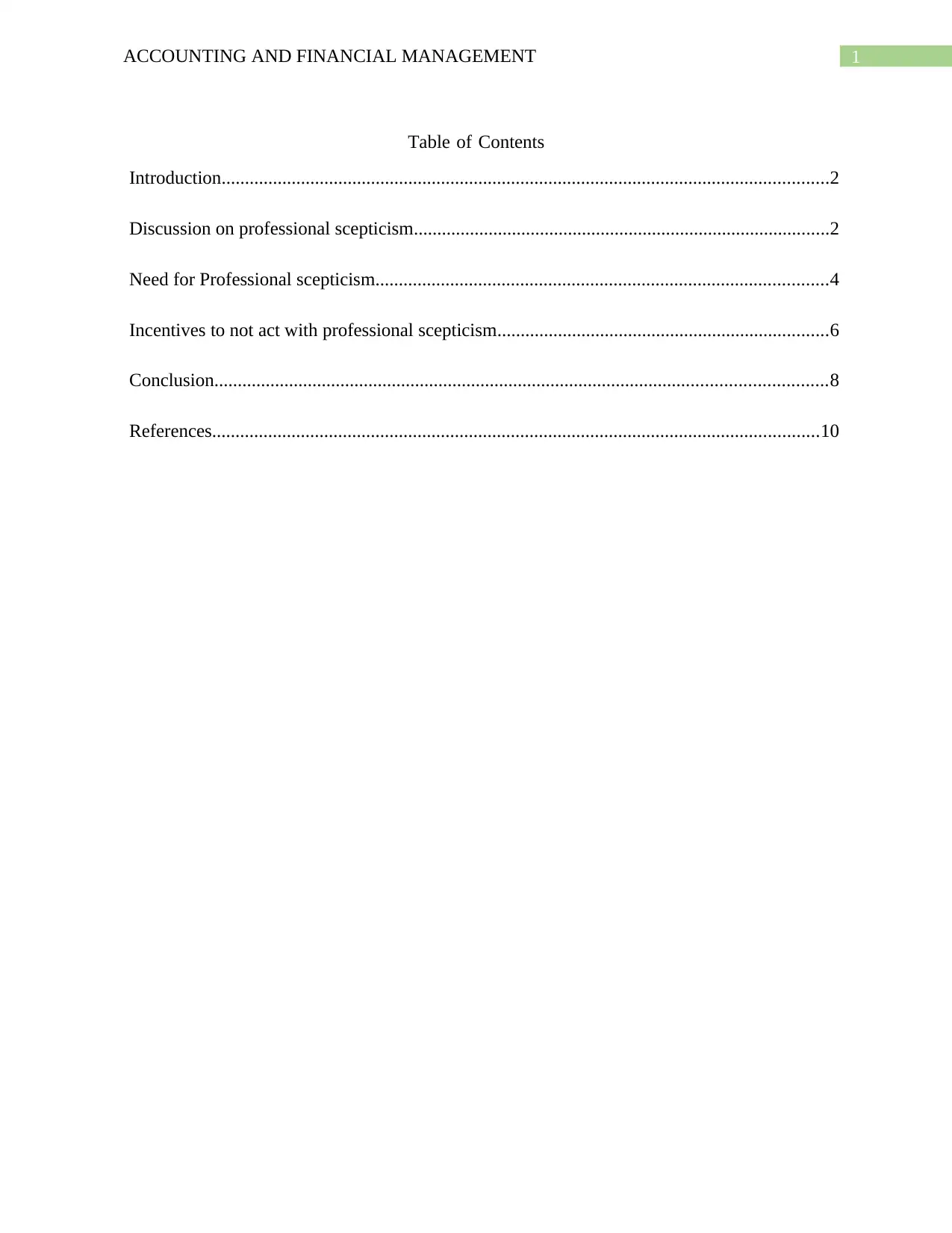
1ACCOUNTING AND FINANCIAL MANAGEMENT
Table of Contents
Introduction..................................................................................................................................2
Discussion on professional scepticism.........................................................................................2
Need for Professional scepticism.................................................................................................4
Incentives to not act with professional scepticism.......................................................................6
Conclusion...................................................................................................................................8
References..................................................................................................................................10
Table of Contents
Introduction..................................................................................................................................2
Discussion on professional scepticism.........................................................................................2
Need for Professional scepticism.................................................................................................4
Incentives to not act with professional scepticism.......................................................................6
Conclusion...................................................................................................................................8
References..................................................................................................................................10
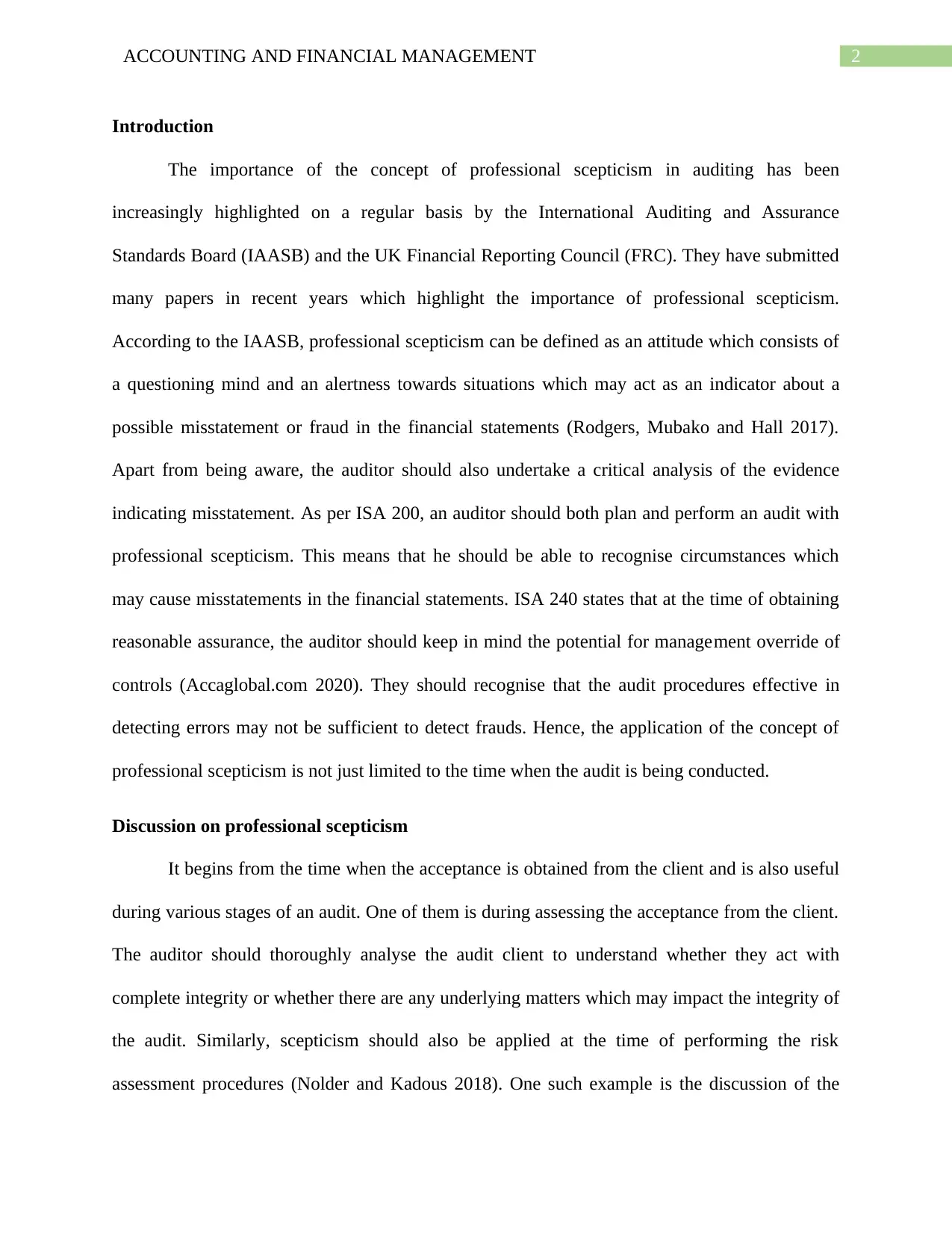
2ACCOUNTING AND FINANCIAL MANAGEMENT
Introduction
The importance of the concept of professional scepticism in auditing has been
increasingly highlighted on a regular basis by the International Auditing and Assurance
Standards Board (IAASB) and the UK Financial Reporting Council (FRC). They have submitted
many papers in recent years which highlight the importance of professional scepticism.
According to the IAASB, professional scepticism can be defined as an attitude which consists of
a questioning mind and an alertness towards situations which may act as an indicator about a
possible misstatement or fraud in the financial statements (Rodgers, Mubako and Hall 2017).
Apart from being aware, the auditor should also undertake a critical analysis of the evidence
indicating misstatement. As per ISA 200, an auditor should both plan and perform an audit with
professional scepticism. This means that he should be able to recognise circumstances which
may cause misstatements in the financial statements. ISA 240 states that at the time of obtaining
reasonable assurance, the auditor should keep in mind the potential for management override of
controls (Accaglobal.com 2020). They should recognise that the audit procedures effective in
detecting errors may not be sufficient to detect frauds. Hence, the application of the concept of
professional scepticism is not just limited to the time when the audit is being conducted.
Discussion on professional scepticism
It begins from the time when the acceptance is obtained from the client and is also useful
during various stages of an audit. One of them is during assessing the acceptance from the client.
The auditor should thoroughly analyse the audit client to understand whether they act with
complete integrity or whether there are any underlying matters which may impact the integrity of
the audit. Similarly, scepticism should also be applied at the time of performing the risk
assessment procedures (Nolder and Kadous 2018). One such example is the discussion of the
Introduction
The importance of the concept of professional scepticism in auditing has been
increasingly highlighted on a regular basis by the International Auditing and Assurance
Standards Board (IAASB) and the UK Financial Reporting Council (FRC). They have submitted
many papers in recent years which highlight the importance of professional scepticism.
According to the IAASB, professional scepticism can be defined as an attitude which consists of
a questioning mind and an alertness towards situations which may act as an indicator about a
possible misstatement or fraud in the financial statements (Rodgers, Mubako and Hall 2017).
Apart from being aware, the auditor should also undertake a critical analysis of the evidence
indicating misstatement. As per ISA 200, an auditor should both plan and perform an audit with
professional scepticism. This means that he should be able to recognise circumstances which
may cause misstatements in the financial statements. ISA 240 states that at the time of obtaining
reasonable assurance, the auditor should keep in mind the potential for management override of
controls (Accaglobal.com 2020). They should recognise that the audit procedures effective in
detecting errors may not be sufficient to detect frauds. Hence, the application of the concept of
professional scepticism is not just limited to the time when the audit is being conducted.
Discussion on professional scepticism
It begins from the time when the acceptance is obtained from the client and is also useful
during various stages of an audit. One of them is during assessing the acceptance from the client.
The auditor should thoroughly analyse the audit client to understand whether they act with
complete integrity or whether there are any underlying matters which may impact the integrity of
the audit. Similarly, scepticism should also be applied at the time of performing the risk
assessment procedures (Nolder and Kadous 2018). One such example is the discussion of the
⊘ This is a preview!⊘
Do you want full access?
Subscribe today to unlock all pages.

Trusted by 1+ million students worldwide
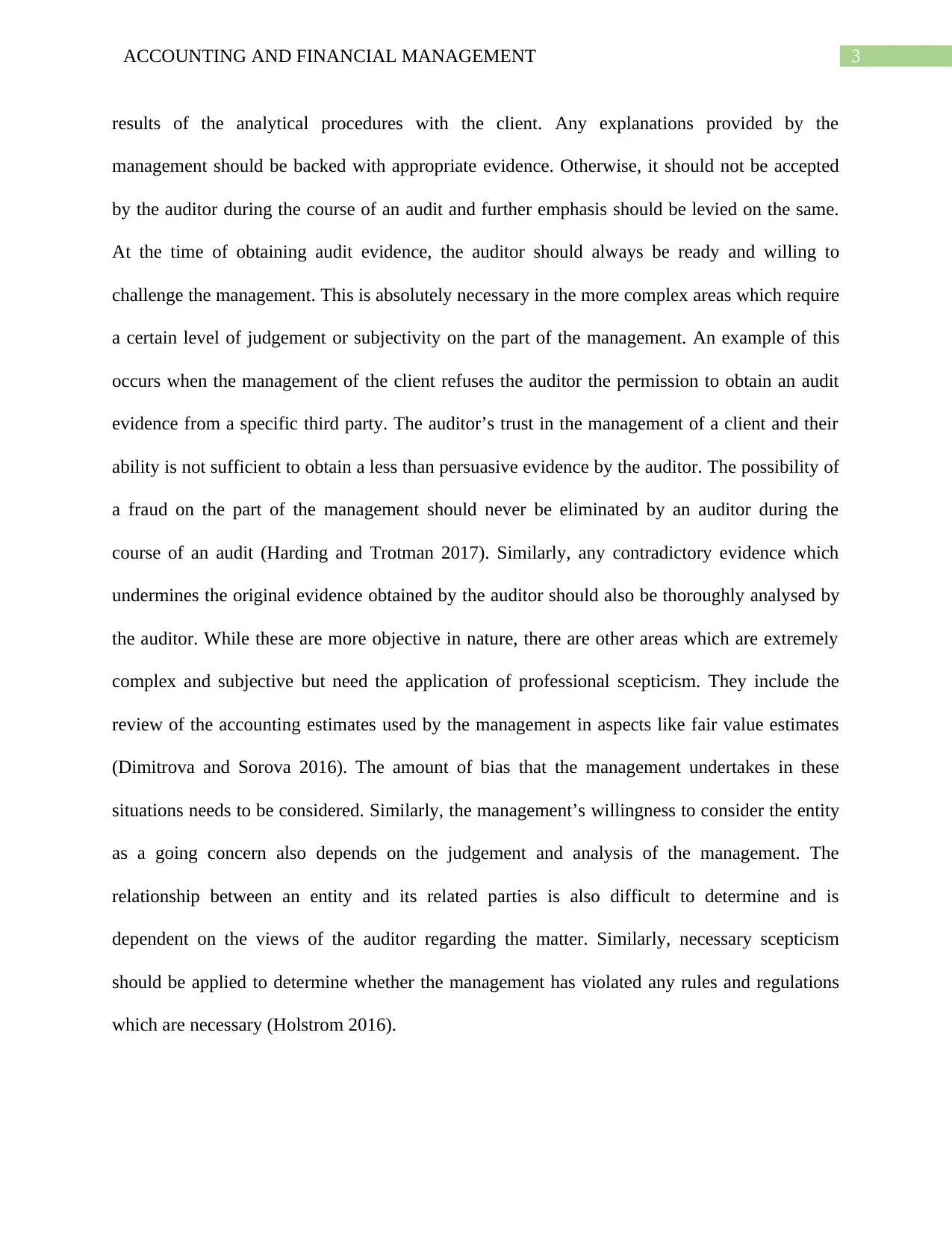
3ACCOUNTING AND FINANCIAL MANAGEMENT
results of the analytical procedures with the client. Any explanations provided by the
management should be backed with appropriate evidence. Otherwise, it should not be accepted
by the auditor during the course of an audit and further emphasis should be levied on the same.
At the time of obtaining audit evidence, the auditor should always be ready and willing to
challenge the management. This is absolutely necessary in the more complex areas which require
a certain level of judgement or subjectivity on the part of the management. An example of this
occurs when the management of the client refuses the auditor the permission to obtain an audit
evidence from a specific third party. The auditor’s trust in the management of a client and their
ability is not sufficient to obtain a less than persuasive evidence by the auditor. The possibility of
a fraud on the part of the management should never be eliminated by an auditor during the
course of an audit (Harding and Trotman 2017). Similarly, any contradictory evidence which
undermines the original evidence obtained by the auditor should also be thoroughly analysed by
the auditor. While these are more objective in nature, there are other areas which are extremely
complex and subjective but need the application of professional scepticism. They include the
review of the accounting estimates used by the management in aspects like fair value estimates
(Dimitrova and Sorova 2016). The amount of bias that the management undertakes in these
situations needs to be considered. Similarly, the management’s willingness to consider the entity
as a going concern also depends on the judgement and analysis of the management. The
relationship between an entity and its related parties is also difficult to determine and is
dependent on the views of the auditor regarding the matter. Similarly, necessary scepticism
should be applied to determine whether the management has violated any rules and regulations
which are necessary (Holstrom 2016).
results of the analytical procedures with the client. Any explanations provided by the
management should be backed with appropriate evidence. Otherwise, it should not be accepted
by the auditor during the course of an audit and further emphasis should be levied on the same.
At the time of obtaining audit evidence, the auditor should always be ready and willing to
challenge the management. This is absolutely necessary in the more complex areas which require
a certain level of judgement or subjectivity on the part of the management. An example of this
occurs when the management of the client refuses the auditor the permission to obtain an audit
evidence from a specific third party. The auditor’s trust in the management of a client and their
ability is not sufficient to obtain a less than persuasive evidence by the auditor. The possibility of
a fraud on the part of the management should never be eliminated by an auditor during the
course of an audit (Harding and Trotman 2017). Similarly, any contradictory evidence which
undermines the original evidence obtained by the auditor should also be thoroughly analysed by
the auditor. While these are more objective in nature, there are other areas which are extremely
complex and subjective but need the application of professional scepticism. They include the
review of the accounting estimates used by the management in aspects like fair value estimates
(Dimitrova and Sorova 2016). The amount of bias that the management undertakes in these
situations needs to be considered. Similarly, the management’s willingness to consider the entity
as a going concern also depends on the judgement and analysis of the management. The
relationship between an entity and its related parties is also difficult to determine and is
dependent on the views of the auditor regarding the matter. Similarly, necessary scepticism
should be applied to determine whether the management has violated any rules and regulations
which are necessary (Holstrom 2016).
Paraphrase This Document
Need a fresh take? Get an instant paraphrase of this document with our AI Paraphraser
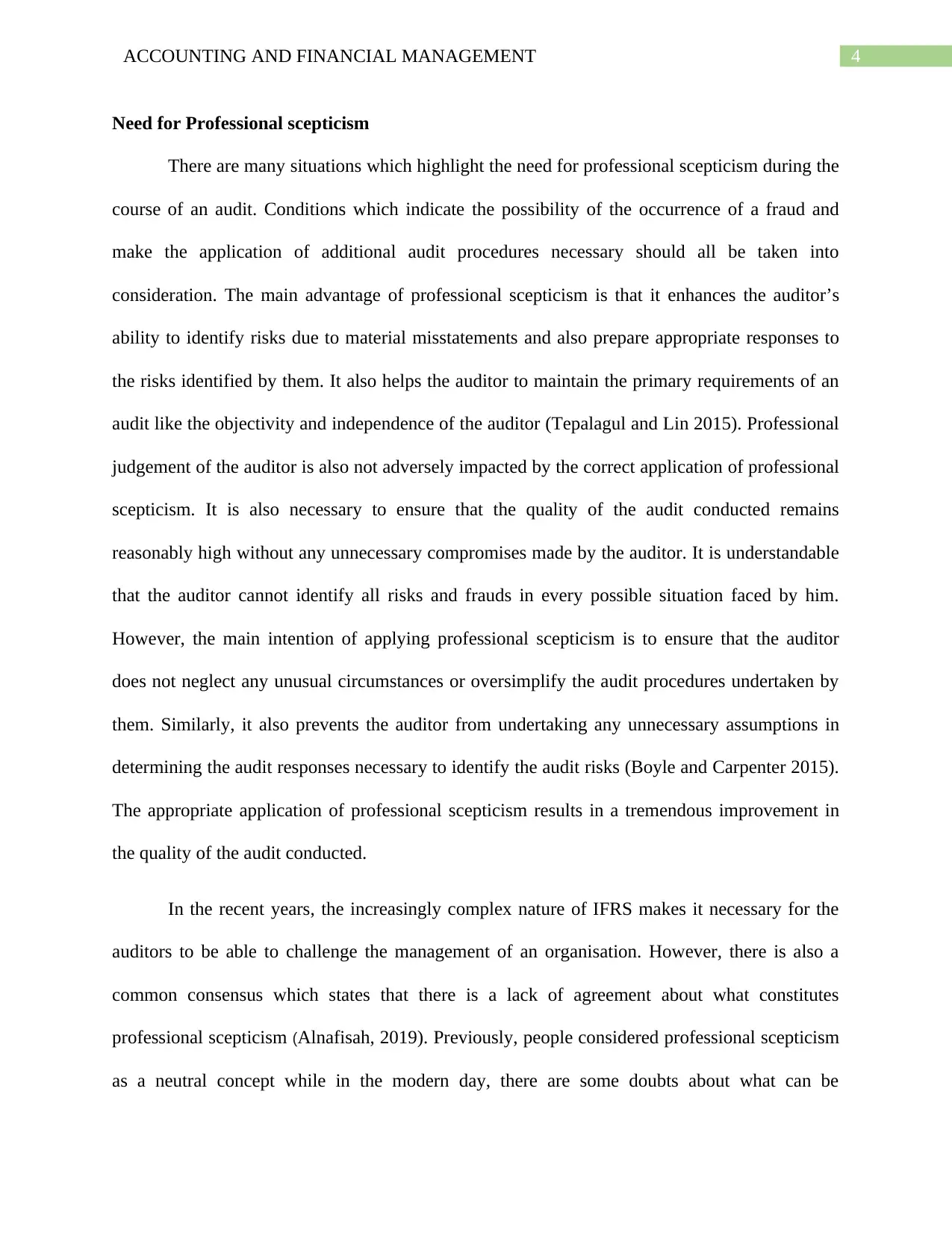
4ACCOUNTING AND FINANCIAL MANAGEMENT
Need for Professional scepticism
There are many situations which highlight the need for professional scepticism during the
course of an audit. Conditions which indicate the possibility of the occurrence of a fraud and
make the application of additional audit procedures necessary should all be taken into
consideration. The main advantage of professional scepticism is that it enhances the auditor’s
ability to identify risks due to material misstatements and also prepare appropriate responses to
the risks identified by them. It also helps the auditor to maintain the primary requirements of an
audit like the objectivity and independence of the auditor (Tepalagul and Lin 2015). Professional
judgement of the auditor is also not adversely impacted by the correct application of professional
scepticism. It is also necessary to ensure that the quality of the audit conducted remains
reasonably high without any unnecessary compromises made by the auditor. It is understandable
that the auditor cannot identify all risks and frauds in every possible situation faced by him.
However, the main intention of applying professional scepticism is to ensure that the auditor
does not neglect any unusual circumstances or oversimplify the audit procedures undertaken by
them. Similarly, it also prevents the auditor from undertaking any unnecessary assumptions in
determining the audit responses necessary to identify the audit risks (Boyle and Carpenter 2015).
The appropriate application of professional scepticism results in a tremendous improvement in
the quality of the audit conducted.
In the recent years, the increasingly complex nature of IFRS makes it necessary for the
auditors to be able to challenge the management of an organisation. However, there is also a
common consensus which states that there is a lack of agreement about what constitutes
professional scepticism (Alnafisah, 2019). Previously, people considered professional scepticism
as a neutral concept while in the modern day, there are some doubts about what can be
Need for Professional scepticism
There are many situations which highlight the need for professional scepticism during the
course of an audit. Conditions which indicate the possibility of the occurrence of a fraud and
make the application of additional audit procedures necessary should all be taken into
consideration. The main advantage of professional scepticism is that it enhances the auditor’s
ability to identify risks due to material misstatements and also prepare appropriate responses to
the risks identified by them. It also helps the auditor to maintain the primary requirements of an
audit like the objectivity and independence of the auditor (Tepalagul and Lin 2015). Professional
judgement of the auditor is also not adversely impacted by the correct application of professional
scepticism. It is also necessary to ensure that the quality of the audit conducted remains
reasonably high without any unnecessary compromises made by the auditor. It is understandable
that the auditor cannot identify all risks and frauds in every possible situation faced by him.
However, the main intention of applying professional scepticism is to ensure that the auditor
does not neglect any unusual circumstances or oversimplify the audit procedures undertaken by
them. Similarly, it also prevents the auditor from undertaking any unnecessary assumptions in
determining the audit responses necessary to identify the audit risks (Boyle and Carpenter 2015).
The appropriate application of professional scepticism results in a tremendous improvement in
the quality of the audit conducted.
In the recent years, the increasingly complex nature of IFRS makes it necessary for the
auditors to be able to challenge the management of an organisation. However, there is also a
common consensus which states that there is a lack of agreement about what constitutes
professional scepticism (Alnafisah, 2019). Previously, people considered professional scepticism
as a neutral concept while in the modern day, there are some doubts about what can be
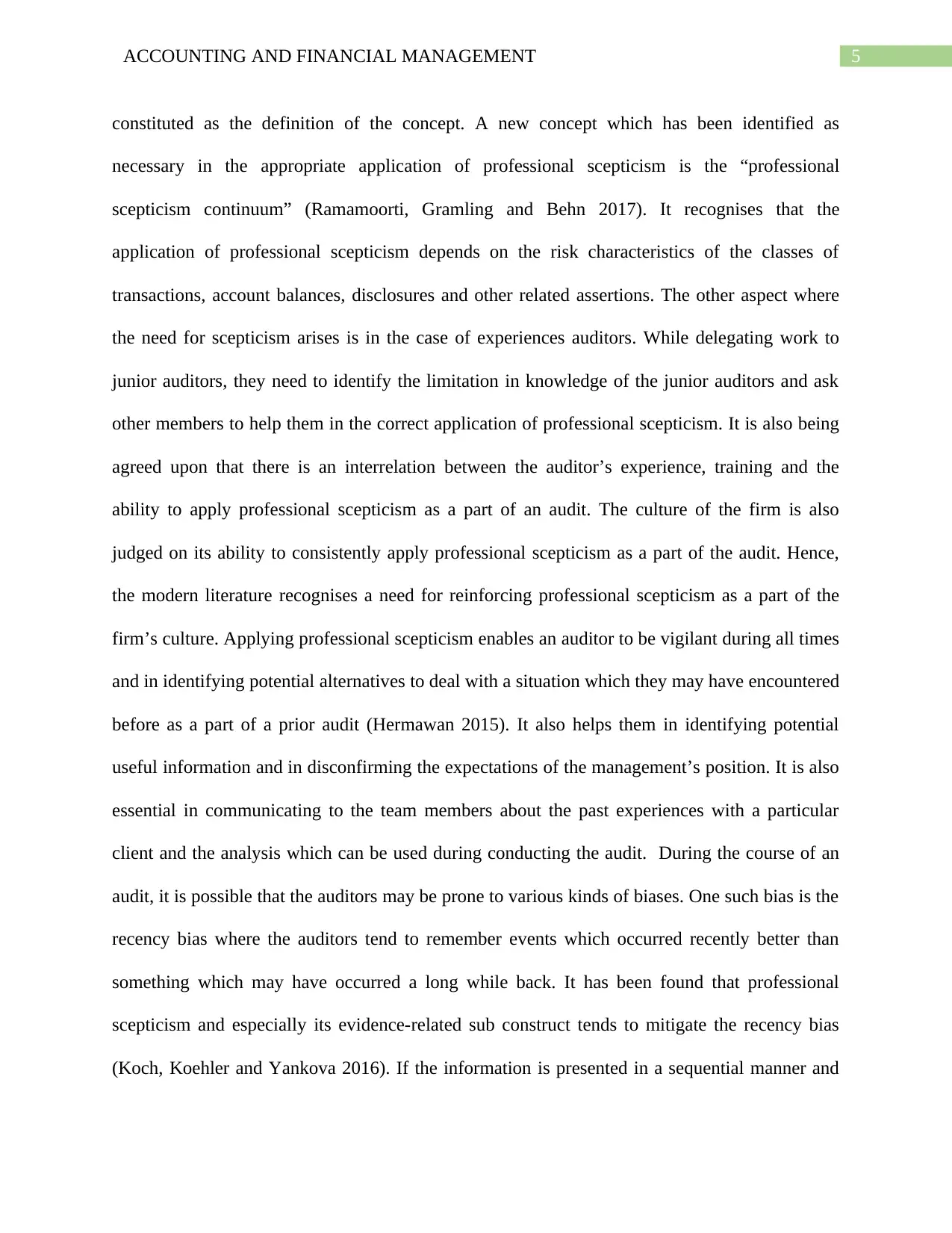
5ACCOUNTING AND FINANCIAL MANAGEMENT
constituted as the definition of the concept. A new concept which has been identified as
necessary in the appropriate application of professional scepticism is the “professional
scepticism continuum” (Ramamoorti, Gramling and Behn 2017). It recognises that the
application of professional scepticism depends on the risk characteristics of the classes of
transactions, account balances, disclosures and other related assertions. The other aspect where
the need for scepticism arises is in the case of experiences auditors. While delegating work to
junior auditors, they need to identify the limitation in knowledge of the junior auditors and ask
other members to help them in the correct application of professional scepticism. It is also being
agreed upon that there is an interrelation between the auditor’s experience, training and the
ability to apply professional scepticism as a part of an audit. The culture of the firm is also
judged on its ability to consistently apply professional scepticism as a part of the audit. Hence,
the modern literature recognises a need for reinforcing professional scepticism as a part of the
firm’s culture. Applying professional scepticism enables an auditor to be vigilant during all times
and in identifying potential alternatives to deal with a situation which they may have encountered
before as a part of a prior audit (Hermawan 2015). It also helps them in identifying potential
useful information and in disconfirming the expectations of the management’s position. It is also
essential in communicating to the team members about the past experiences with a particular
client and the analysis which can be used during conducting the audit. During the course of an
audit, it is possible that the auditors may be prone to various kinds of biases. One such bias is the
recency bias where the auditors tend to remember events which occurred recently better than
something which may have occurred a long while back. It has been found that professional
scepticism and especially its evidence-related sub construct tends to mitigate the recency bias
(Koch, Koehler and Yankova 2016). If the information is presented in a sequential manner and
constituted as the definition of the concept. A new concept which has been identified as
necessary in the appropriate application of professional scepticism is the “professional
scepticism continuum” (Ramamoorti, Gramling and Behn 2017). It recognises that the
application of professional scepticism depends on the risk characteristics of the classes of
transactions, account balances, disclosures and other related assertions. The other aspect where
the need for scepticism arises is in the case of experiences auditors. While delegating work to
junior auditors, they need to identify the limitation in knowledge of the junior auditors and ask
other members to help them in the correct application of professional scepticism. It is also being
agreed upon that there is an interrelation between the auditor’s experience, training and the
ability to apply professional scepticism as a part of an audit. The culture of the firm is also
judged on its ability to consistently apply professional scepticism as a part of the audit. Hence,
the modern literature recognises a need for reinforcing professional scepticism as a part of the
firm’s culture. Applying professional scepticism enables an auditor to be vigilant during all times
and in identifying potential alternatives to deal with a situation which they may have encountered
before as a part of a prior audit (Hermawan 2015). It also helps them in identifying potential
useful information and in disconfirming the expectations of the management’s position. It is also
essential in communicating to the team members about the past experiences with a particular
client and the analysis which can be used during conducting the audit. During the course of an
audit, it is possible that the auditors may be prone to various kinds of biases. One such bias is the
recency bias where the auditors tend to remember events which occurred recently better than
something which may have occurred a long while back. It has been found that professional
scepticism and especially its evidence-related sub construct tends to mitigate the recency bias
(Koch, Koehler and Yankova 2016). If the information is presented in a sequential manner and
⊘ This is a preview!⊘
Do you want full access?
Subscribe today to unlock all pages.

Trusted by 1+ million students worldwide
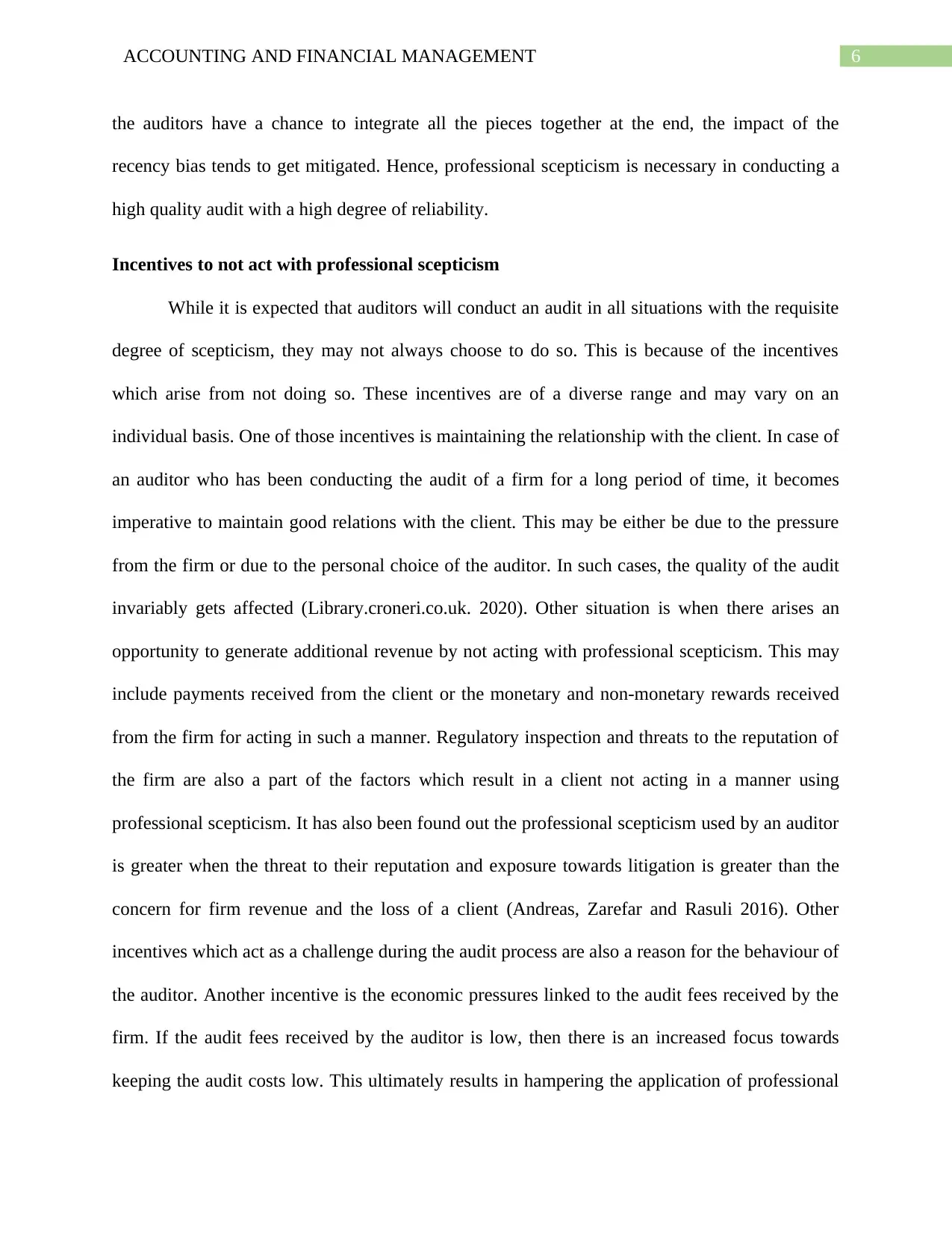
6ACCOUNTING AND FINANCIAL MANAGEMENT
the auditors have a chance to integrate all the pieces together at the end, the impact of the
recency bias tends to get mitigated. Hence, professional scepticism is necessary in conducting a
high quality audit with a high degree of reliability.
Incentives to not act with professional scepticism
While it is expected that auditors will conduct an audit in all situations with the requisite
degree of scepticism, they may not always choose to do so. This is because of the incentives
which arise from not doing so. These incentives are of a diverse range and may vary on an
individual basis. One of those incentives is maintaining the relationship with the client. In case of
an auditor who has been conducting the audit of a firm for a long period of time, it becomes
imperative to maintain good relations with the client. This may be either be due to the pressure
from the firm or due to the personal choice of the auditor. In such cases, the quality of the audit
invariably gets affected (Library.croneri.co.uk. 2020). Other situation is when there arises an
opportunity to generate additional revenue by not acting with professional scepticism. This may
include payments received from the client or the monetary and non-monetary rewards received
from the firm for acting in such a manner. Regulatory inspection and threats to the reputation of
the firm are also a part of the factors which result in a client not acting in a manner using
professional scepticism. It has also been found out the professional scepticism used by an auditor
is greater when the threat to their reputation and exposure towards litigation is greater than the
concern for firm revenue and the loss of a client (Andreas, Zarefar and Rasuli 2016). Other
incentives which act as a challenge during the audit process are also a reason for the behaviour of
the auditor. Another incentive is the economic pressures linked to the audit fees received by the
firm. If the audit fees received by the auditor is low, then there is an increased focus towards
keeping the audit costs low. This ultimately results in hampering the application of professional
the auditors have a chance to integrate all the pieces together at the end, the impact of the
recency bias tends to get mitigated. Hence, professional scepticism is necessary in conducting a
high quality audit with a high degree of reliability.
Incentives to not act with professional scepticism
While it is expected that auditors will conduct an audit in all situations with the requisite
degree of scepticism, they may not always choose to do so. This is because of the incentives
which arise from not doing so. These incentives are of a diverse range and may vary on an
individual basis. One of those incentives is maintaining the relationship with the client. In case of
an auditor who has been conducting the audit of a firm for a long period of time, it becomes
imperative to maintain good relations with the client. This may be either be due to the pressure
from the firm or due to the personal choice of the auditor. In such cases, the quality of the audit
invariably gets affected (Library.croneri.co.uk. 2020). Other situation is when there arises an
opportunity to generate additional revenue by not acting with professional scepticism. This may
include payments received from the client or the monetary and non-monetary rewards received
from the firm for acting in such a manner. Regulatory inspection and threats to the reputation of
the firm are also a part of the factors which result in a client not acting in a manner using
professional scepticism. It has also been found out the professional scepticism used by an auditor
is greater when the threat to their reputation and exposure towards litigation is greater than the
concern for firm revenue and the loss of a client (Andreas, Zarefar and Rasuli 2016). Other
incentives which act as a challenge during the audit process are also a reason for the behaviour of
the auditor. Another incentive is the economic pressures linked to the audit fees received by the
firm. If the audit fees received by the auditor is low, then there is an increased focus towards
keeping the audit costs low. This ultimately results in hampering the application of professional
Paraphrase This Document
Need a fresh take? Get an instant paraphrase of this document with our AI Paraphraser
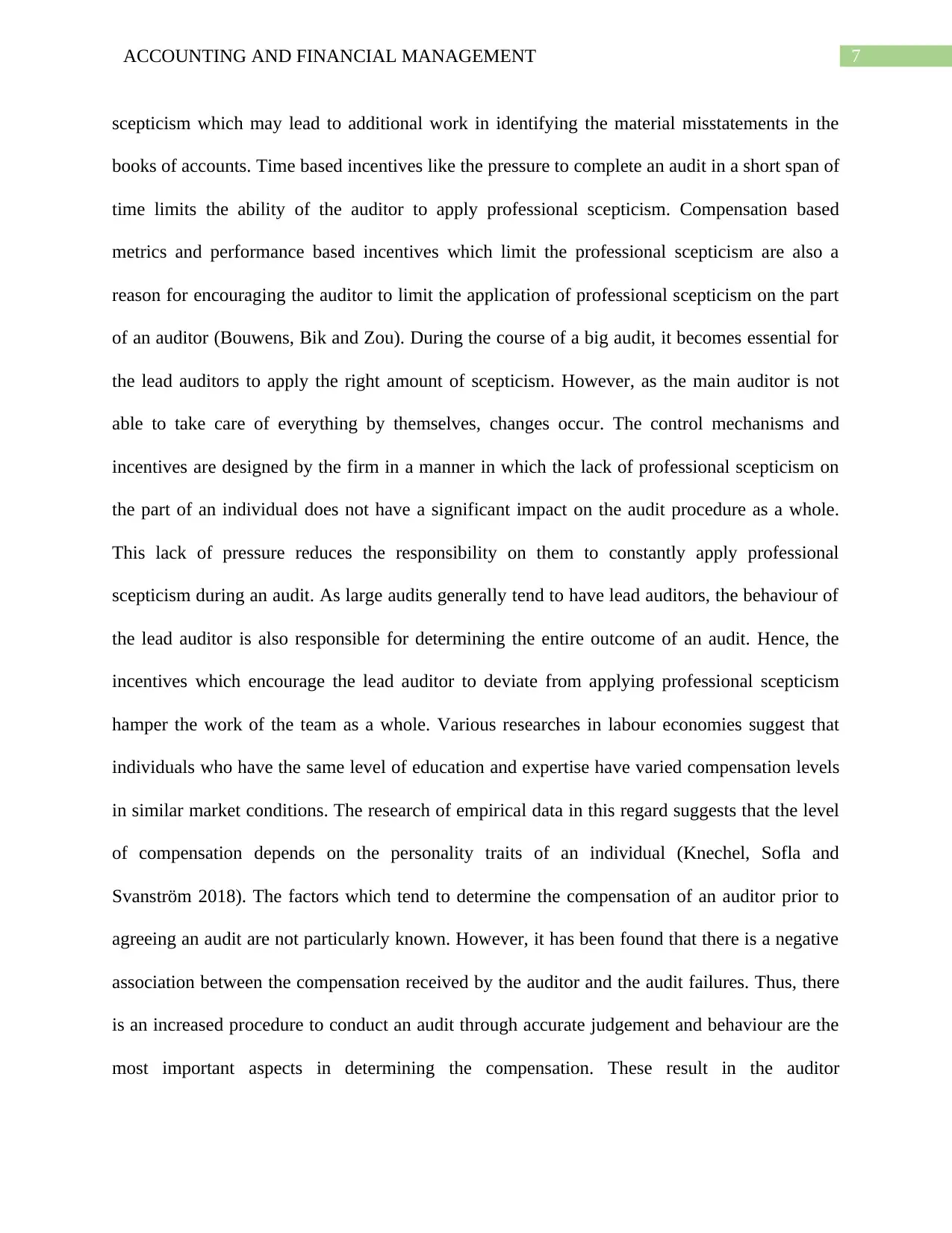
7ACCOUNTING AND FINANCIAL MANAGEMENT
scepticism which may lead to additional work in identifying the material misstatements in the
books of accounts. Time based incentives like the pressure to complete an audit in a short span of
time limits the ability of the auditor to apply professional scepticism. Compensation based
metrics and performance based incentives which limit the professional scepticism are also a
reason for encouraging the auditor to limit the application of professional scepticism on the part
of an auditor (Bouwens, Bik and Zou). During the course of a big audit, it becomes essential for
the lead auditors to apply the right amount of scepticism. However, as the main auditor is not
able to take care of everything by themselves, changes occur. The control mechanisms and
incentives are designed by the firm in a manner in which the lack of professional scepticism on
the part of an individual does not have a significant impact on the audit procedure as a whole.
This lack of pressure reduces the responsibility on them to constantly apply professional
scepticism during an audit. As large audits generally tend to have lead auditors, the behaviour of
the lead auditor is also responsible for determining the entire outcome of an audit. Hence, the
incentives which encourage the lead auditor to deviate from applying professional scepticism
hamper the work of the team as a whole. Various researches in labour economies suggest that
individuals who have the same level of education and expertise have varied compensation levels
in similar market conditions. The research of empirical data in this regard suggests that the level
of compensation depends on the personality traits of an individual (Knechel, Sofla and
Svanström 2018). The factors which tend to determine the compensation of an auditor prior to
agreeing an audit are not particularly known. However, it has been found that there is a negative
association between the compensation received by the auditor and the audit failures. Thus, there
is an increased procedure to conduct an audit through accurate judgement and behaviour are the
most important aspects in determining the compensation. These result in the auditor
scepticism which may lead to additional work in identifying the material misstatements in the
books of accounts. Time based incentives like the pressure to complete an audit in a short span of
time limits the ability of the auditor to apply professional scepticism. Compensation based
metrics and performance based incentives which limit the professional scepticism are also a
reason for encouraging the auditor to limit the application of professional scepticism on the part
of an auditor (Bouwens, Bik and Zou). During the course of a big audit, it becomes essential for
the lead auditors to apply the right amount of scepticism. However, as the main auditor is not
able to take care of everything by themselves, changes occur. The control mechanisms and
incentives are designed by the firm in a manner in which the lack of professional scepticism on
the part of an individual does not have a significant impact on the audit procedure as a whole.
This lack of pressure reduces the responsibility on them to constantly apply professional
scepticism during an audit. As large audits generally tend to have lead auditors, the behaviour of
the lead auditor is also responsible for determining the entire outcome of an audit. Hence, the
incentives which encourage the lead auditor to deviate from applying professional scepticism
hamper the work of the team as a whole. Various researches in labour economies suggest that
individuals who have the same level of education and expertise have varied compensation levels
in similar market conditions. The research of empirical data in this regard suggests that the level
of compensation depends on the personality traits of an individual (Knechel, Sofla and
Svanström 2018). The factors which tend to determine the compensation of an auditor prior to
agreeing an audit are not particularly known. However, it has been found that there is a negative
association between the compensation received by the auditor and the audit failures. Thus, there
is an increased procedure to conduct an audit through accurate judgement and behaviour are the
most important aspects in determining the compensation. These result in the auditor
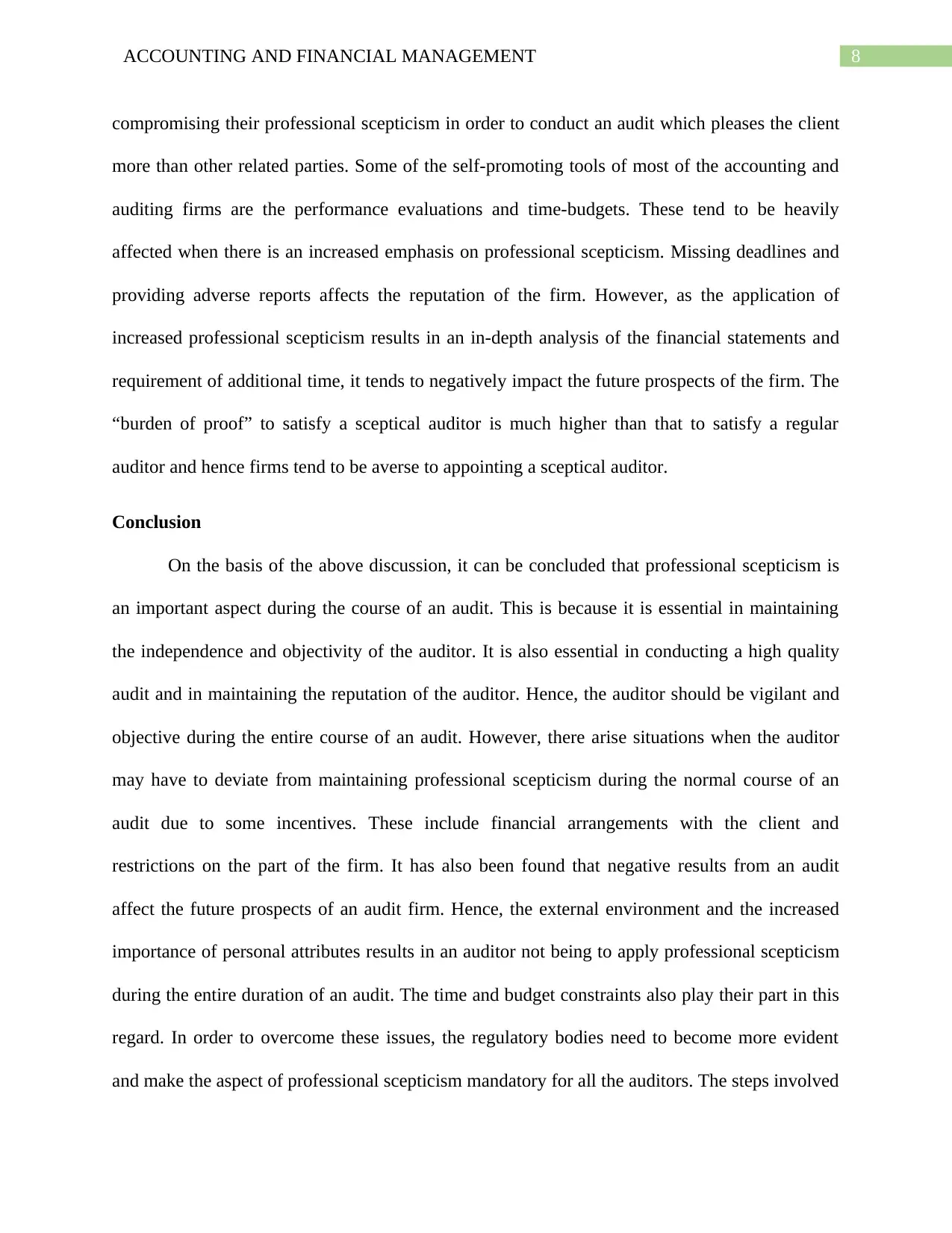
8ACCOUNTING AND FINANCIAL MANAGEMENT
compromising their professional scepticism in order to conduct an audit which pleases the client
more than other related parties. Some of the self-promoting tools of most of the accounting and
auditing firms are the performance evaluations and time-budgets. These tend to be heavily
affected when there is an increased emphasis on professional scepticism. Missing deadlines and
providing adverse reports affects the reputation of the firm. However, as the application of
increased professional scepticism results in an in-depth analysis of the financial statements and
requirement of additional time, it tends to negatively impact the future prospects of the firm. The
“burden of proof” to satisfy a sceptical auditor is much higher than that to satisfy a regular
auditor and hence firms tend to be averse to appointing a sceptical auditor.
Conclusion
On the basis of the above discussion, it can be concluded that professional scepticism is
an important aspect during the course of an audit. This is because it is essential in maintaining
the independence and objectivity of the auditor. It is also essential in conducting a high quality
audit and in maintaining the reputation of the auditor. Hence, the auditor should be vigilant and
objective during the entire course of an audit. However, there arise situations when the auditor
may have to deviate from maintaining professional scepticism during the normal course of an
audit due to some incentives. These include financial arrangements with the client and
restrictions on the part of the firm. It has also been found that negative results from an audit
affect the future prospects of an audit firm. Hence, the external environment and the increased
importance of personal attributes results in an auditor not being to apply professional scepticism
during the entire duration of an audit. The time and budget constraints also play their part in this
regard. In order to overcome these issues, the regulatory bodies need to become more evident
and make the aspect of professional scepticism mandatory for all the auditors. The steps involved
compromising their professional scepticism in order to conduct an audit which pleases the client
more than other related parties. Some of the self-promoting tools of most of the accounting and
auditing firms are the performance evaluations and time-budgets. These tend to be heavily
affected when there is an increased emphasis on professional scepticism. Missing deadlines and
providing adverse reports affects the reputation of the firm. However, as the application of
increased professional scepticism results in an in-depth analysis of the financial statements and
requirement of additional time, it tends to negatively impact the future prospects of the firm. The
“burden of proof” to satisfy a sceptical auditor is much higher than that to satisfy a regular
auditor and hence firms tend to be averse to appointing a sceptical auditor.
Conclusion
On the basis of the above discussion, it can be concluded that professional scepticism is
an important aspect during the course of an audit. This is because it is essential in maintaining
the independence and objectivity of the auditor. It is also essential in conducting a high quality
audit and in maintaining the reputation of the auditor. Hence, the auditor should be vigilant and
objective during the entire course of an audit. However, there arise situations when the auditor
may have to deviate from maintaining professional scepticism during the normal course of an
audit due to some incentives. These include financial arrangements with the client and
restrictions on the part of the firm. It has also been found that negative results from an audit
affect the future prospects of an audit firm. Hence, the external environment and the increased
importance of personal attributes results in an auditor not being to apply professional scepticism
during the entire duration of an audit. The time and budget constraints also play their part in this
regard. In order to overcome these issues, the regulatory bodies need to become more evident
and make the aspect of professional scepticism mandatory for all the auditors. The steps involved
⊘ This is a preview!⊘
Do you want full access?
Subscribe today to unlock all pages.

Trusted by 1+ million students worldwide
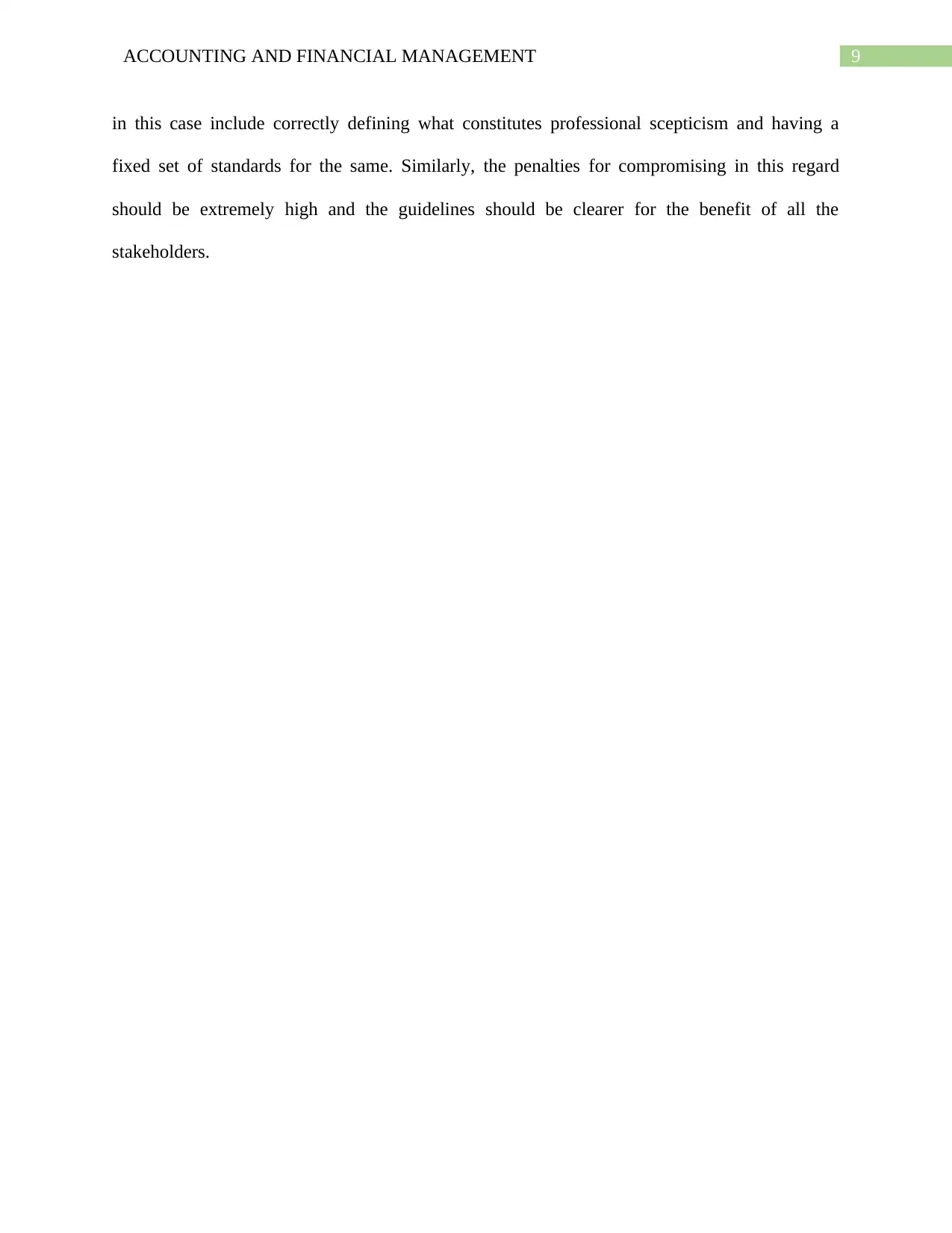
9ACCOUNTING AND FINANCIAL MANAGEMENT
in this case include correctly defining what constitutes professional scepticism and having a
fixed set of standards for the same. Similarly, the penalties for compromising in this regard
should be extremely high and the guidelines should be clearer for the benefit of all the
stakeholders.
in this case include correctly defining what constitutes professional scepticism and having a
fixed set of standards for the same. Similarly, the penalties for compromising in this regard
should be extremely high and the guidelines should be clearer for the benefit of all the
stakeholders.
Paraphrase This Document
Need a fresh take? Get an instant paraphrase of this document with our AI Paraphraser
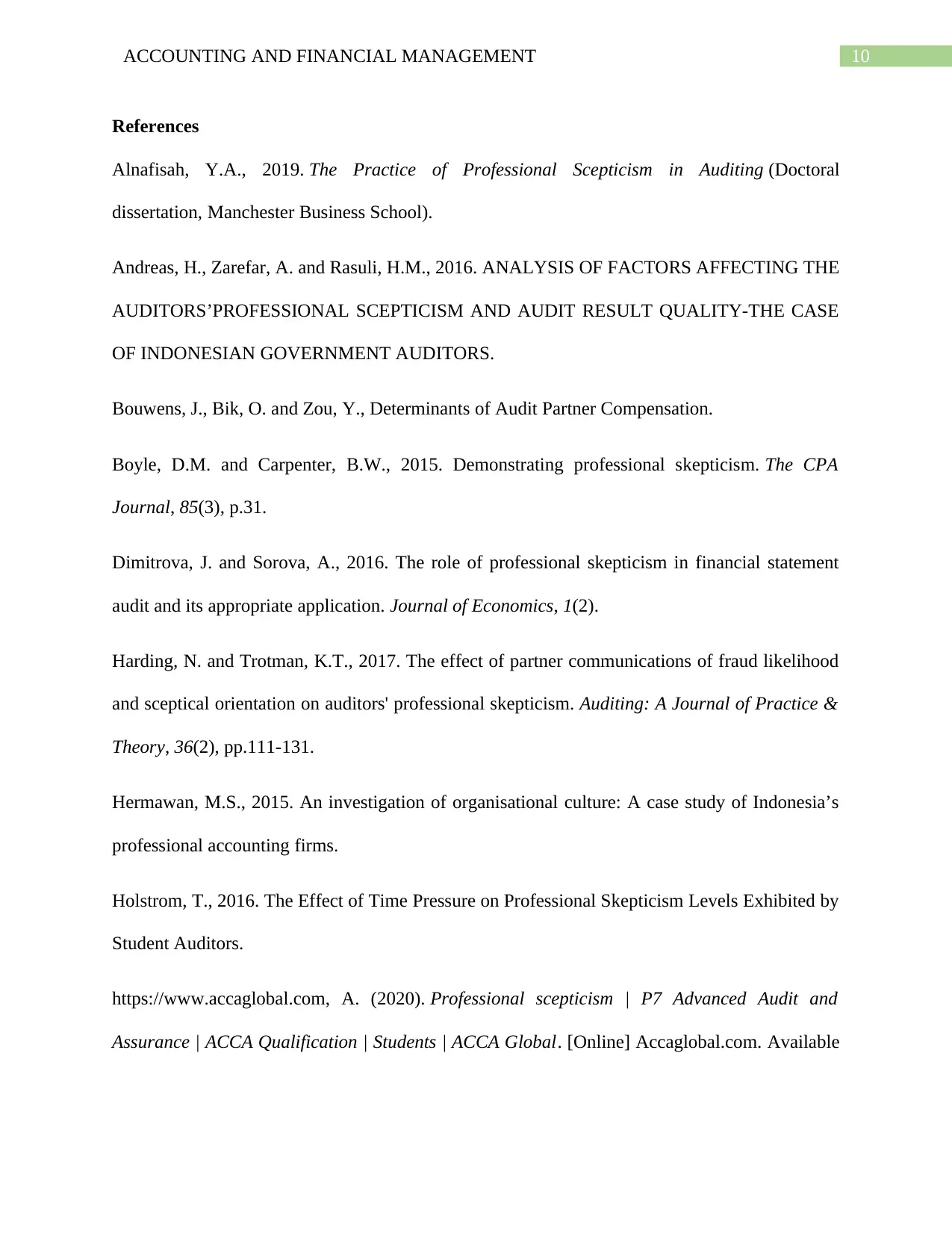
10ACCOUNTING AND FINANCIAL MANAGEMENT
References
Alnafisah, Y.A., 2019. The Practice of Professional Scepticism in Auditing (Doctoral
dissertation, Manchester Business School).
Andreas, H., Zarefar, A. and Rasuli, H.M., 2016. ANALYSIS OF FACTORS AFFECTING THE
AUDITORS’PROFESSIONAL SCEPTICISM AND AUDIT RESULT QUALITY-THE CASE
OF INDONESIAN GOVERNMENT AUDITORS.
Bouwens, J., Bik, O. and Zou, Y., Determinants of Audit Partner Compensation.
Boyle, D.M. and Carpenter, B.W., 2015. Demonstrating professional skepticism. The CPA
Journal, 85(3), p.31.
Dimitrova, J. and Sorova, A., 2016. The role of professional skepticism in financial statement
audit and its appropriate application. Journal of Economics, 1(2).
Harding, N. and Trotman, K.T., 2017. The effect of partner communications of fraud likelihood
and sceptical orientation on auditors' professional skepticism. Auditing: A Journal of Practice &
Theory, 36(2), pp.111-131.
Hermawan, M.S., 2015. An investigation of organisational culture: A case study of Indonesia’s
professional accounting firms.
Holstrom, T., 2016. The Effect of Time Pressure on Professional Skepticism Levels Exhibited by
Student Auditors.
https://www.accaglobal.com, A. (2020). Professional scepticism | P7 Advanced Audit and
Assurance | ACCA Qualification | Students | ACCA Global. [Online] Accaglobal.com. Available
References
Alnafisah, Y.A., 2019. The Practice of Professional Scepticism in Auditing (Doctoral
dissertation, Manchester Business School).
Andreas, H., Zarefar, A. and Rasuli, H.M., 2016. ANALYSIS OF FACTORS AFFECTING THE
AUDITORS’PROFESSIONAL SCEPTICISM AND AUDIT RESULT QUALITY-THE CASE
OF INDONESIAN GOVERNMENT AUDITORS.
Bouwens, J., Bik, O. and Zou, Y., Determinants of Audit Partner Compensation.
Boyle, D.M. and Carpenter, B.W., 2015. Demonstrating professional skepticism. The CPA
Journal, 85(3), p.31.
Dimitrova, J. and Sorova, A., 2016. The role of professional skepticism in financial statement
audit and its appropriate application. Journal of Economics, 1(2).
Harding, N. and Trotman, K.T., 2017. The effect of partner communications of fraud likelihood
and sceptical orientation on auditors' professional skepticism. Auditing: A Journal of Practice &
Theory, 36(2), pp.111-131.
Hermawan, M.S., 2015. An investigation of organisational culture: A case study of Indonesia’s
professional accounting firms.
Holstrom, T., 2016. The Effect of Time Pressure on Professional Skepticism Levels Exhibited by
Student Auditors.
https://www.accaglobal.com, A. (2020). Professional scepticism | P7 Advanced Audit and
Assurance | ACCA Qualification | Students | ACCA Global. [Online] Accaglobal.com. Available
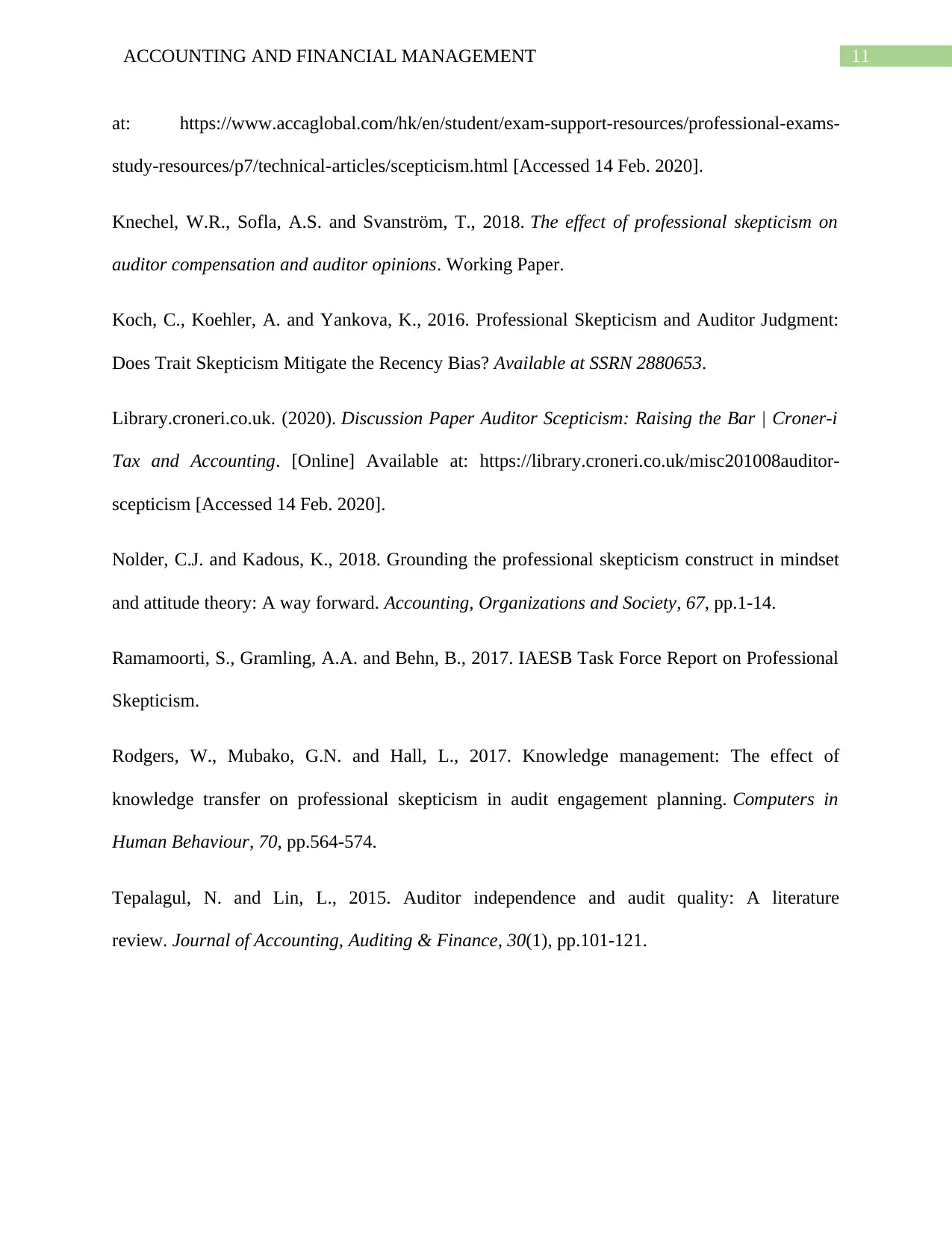
11ACCOUNTING AND FINANCIAL MANAGEMENT
at: https://www.accaglobal.com/hk/en/student/exam-support-resources/professional-exams-
study-resources/p7/technical-articles/scepticism.html [Accessed 14 Feb. 2020].
Knechel, W.R., Sofla, A.S. and Svanström, T., 2018. The effect of professional skepticism on
auditor compensation and auditor opinions. Working Paper.
Koch, C., Koehler, A. and Yankova, K., 2016. Professional Skepticism and Auditor Judgment:
Does Trait Skepticism Mitigate the Recency Bias? Available at SSRN 2880653.
Library.croneri.co.uk. (2020). Discussion Paper Auditor Scepticism: Raising the Bar | Croner-i
Tax and Accounting. [Online] Available at: https://library.croneri.co.uk/misc201008auditor-
scepticism [Accessed 14 Feb. 2020].
Nolder, C.J. and Kadous, K., 2018. Grounding the professional skepticism construct in mindset
and attitude theory: A way forward. Accounting, Organizations and Society, 67, pp.1-14.
Ramamoorti, S., Gramling, A.A. and Behn, B., 2017. IAESB Task Force Report on Professional
Skepticism.
Rodgers, W., Mubako, G.N. and Hall, L., 2017. Knowledge management: The effect of
knowledge transfer on professional skepticism in audit engagement planning. Computers in
Human Behaviour, 70, pp.564-574.
Tepalagul, N. and Lin, L., 2015. Auditor independence and audit quality: A literature
review. Journal of Accounting, Auditing & Finance, 30(1), pp.101-121.
at: https://www.accaglobal.com/hk/en/student/exam-support-resources/professional-exams-
study-resources/p7/technical-articles/scepticism.html [Accessed 14 Feb. 2020].
Knechel, W.R., Sofla, A.S. and Svanström, T., 2018. The effect of professional skepticism on
auditor compensation and auditor opinions. Working Paper.
Koch, C., Koehler, A. and Yankova, K., 2016. Professional Skepticism and Auditor Judgment:
Does Trait Skepticism Mitigate the Recency Bias? Available at SSRN 2880653.
Library.croneri.co.uk. (2020). Discussion Paper Auditor Scepticism: Raising the Bar | Croner-i
Tax and Accounting. [Online] Available at: https://library.croneri.co.uk/misc201008auditor-
scepticism [Accessed 14 Feb. 2020].
Nolder, C.J. and Kadous, K., 2018. Grounding the professional skepticism construct in mindset
and attitude theory: A way forward. Accounting, Organizations and Society, 67, pp.1-14.
Ramamoorti, S., Gramling, A.A. and Behn, B., 2017. IAESB Task Force Report on Professional
Skepticism.
Rodgers, W., Mubako, G.N. and Hall, L., 2017. Knowledge management: The effect of
knowledge transfer on professional skepticism in audit engagement planning. Computers in
Human Behaviour, 70, pp.564-574.
Tepalagul, N. and Lin, L., 2015. Auditor independence and audit quality: A literature
review. Journal of Accounting, Auditing & Finance, 30(1), pp.101-121.
⊘ This is a preview!⊘
Do you want full access?
Subscribe today to unlock all pages.

Trusted by 1+ million students worldwide
1 out of 12
Related Documents
Your All-in-One AI-Powered Toolkit for Academic Success.
+13062052269
info@desklib.com
Available 24*7 on WhatsApp / Email
![[object Object]](/_next/static/media/star-bottom.7253800d.svg)
Unlock your academic potential
Copyright © 2020–2025 A2Z Services. All Rights Reserved. Developed and managed by ZUCOL.





